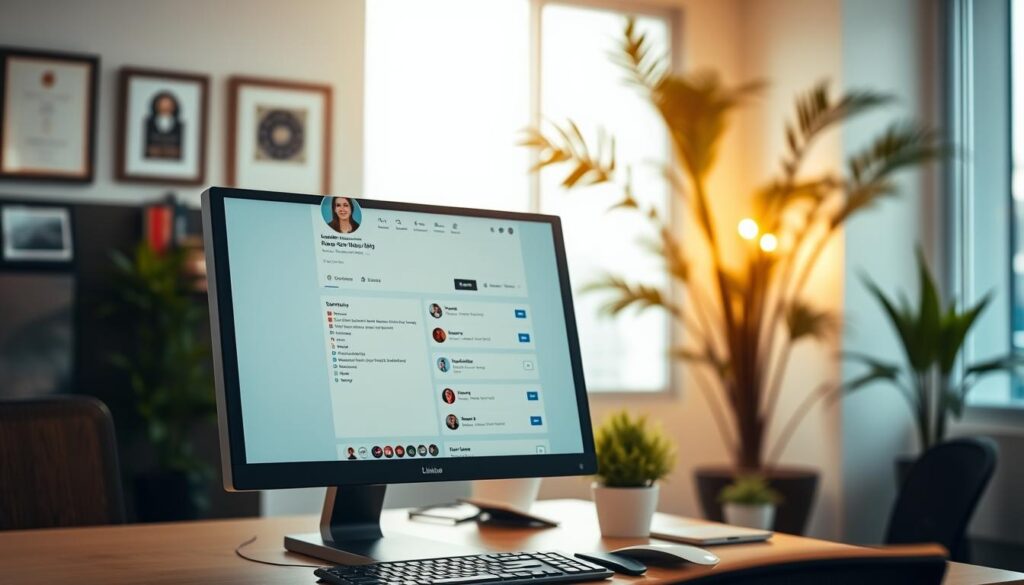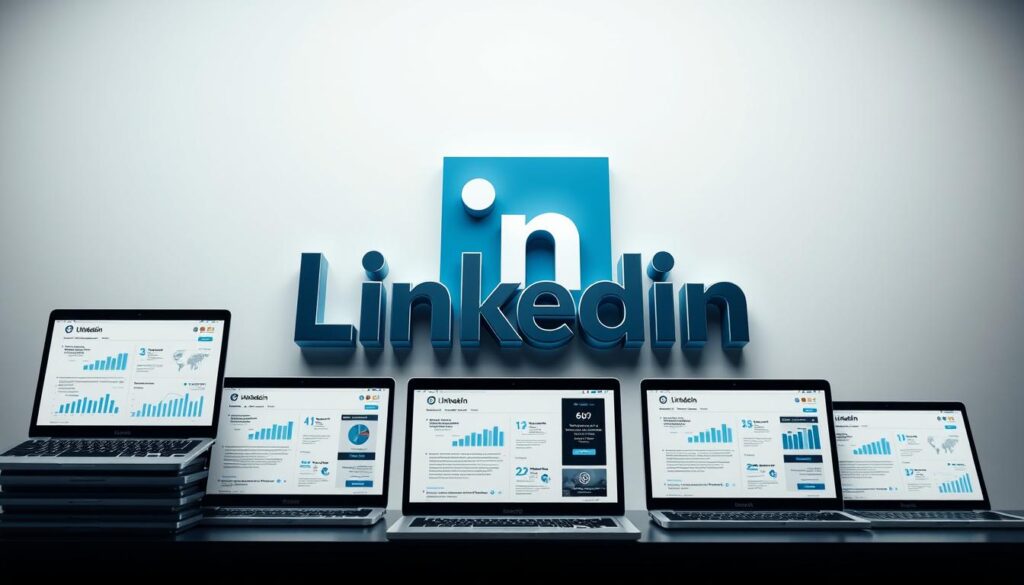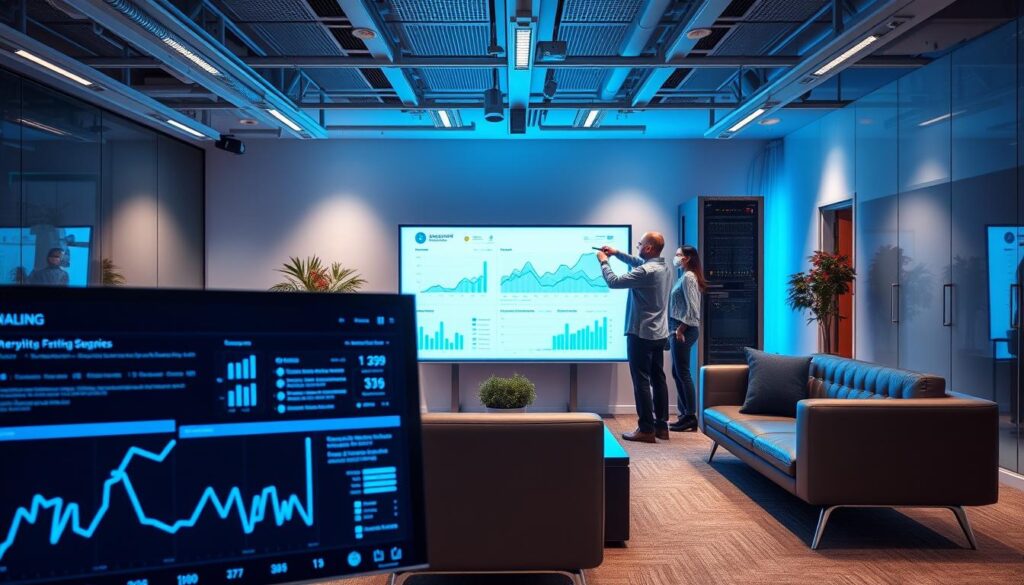Did you know that 4 out of 5 leads from social media come from one platform? With over 900 million members, this professional network is a goldmine for businesses aiming to connect with decision-makers. It’s not just about numbers—this platform is 277% more effective for lead generation than other social media giants.
For companies looking to grow, this platform offers a unique opportunity to reach a highly targeted audience. From optimizing profiles to crafting compelling ads, the strategies used here have delivered results like $16.76 per lead. This article dives into proven techniques that have driven measurable success for businesses across industries.
Whether you’re new to this platform or looking to refine your approach, this guide will walk you through the steps to create impactful campaigns. You’ll learn how to leverage organic strategies, optimize your content, and use automation to achieve your goals. Let’s explore how to turn connections into conversions.
Key Takeaways
- This platform is 277% more effective for lead generation than other social media channels.
- Over 900 million professionals make it ideal for targeted outreach.
- Successful campaigns have achieved leads at $16.76 per lead.
- Optimizing profiles and ads is key to driving results.
- Combining organic and paid strategies maximizes growth.
Understanding LinkedIn as a B2B Lead Generation Powerhouse
Reaching decision-makers has never been easier, thanks to the precision targeting options available. With over 65 million professionals actively engaged, this platform is uniquely positioned to connect businesses with the right audience. Its advanced capabilities allow you to filter by job title, company size, industry, and location, ensuring your message reaches those who matter most.
The Strength of a Professional Audience
The platform’s user base is made up of professionals who are actively seeking solutions for their businesses. This creates an environment where high-quality lead generation thrives. Unlike other platforms, the audience here is focused on professional growth and industry trends, making it easier to craft messages that resonate.
For example, businesses that target specific industries see higher engagement rates. This is because the platform’s users are more likely to engage with content that aligns with their professional goals. By understanding this dynamic, you can design campaigns that are both personalized and scalable.
Decoding LinkedIn’s Targeting Capabilities
One of the platform’s standout features is its ability to filter audiences with precision. You can target decision-makers based on their job title, company size, or even location. This ensures your campaigns are tailored to the right audience, increasing the likelihood of conversions.
Here’s a breakdown of the targeting options available:
| Filter | Description |
|---|---|
| Job Title | Reach professionals based on their role, such as CEOs or marketing managers. |
| Company Size | Target businesses of specific sizes, from startups to large enterprises. |
| Industry | Focus on specific sectors like technology, healthcare, or finance. |
| Location | Narrow your audience by geographic region or country. |
These targeting capabilities enable you to craft messages that resonate with a niche audience. By leveraging these tools, you can design campaigns that drive measurable results. This understanding forms the foundation for optimizing your profile and creating impactful ad strategies.
Optimizing Your LinkedIn Profile for B2B Success

Your professional profile is often the first impression you make on potential clients and partners. A well-crafted profile not only boosts your visibility but also builds trust with your audience. By following best practices, you can ensure your profile stands out and drives meaningful connections.
Profile Best Practices and Keyword Integration
Start with a professional headshot. Profiles with a clear, high-quality photo receive 21 times more views. Your headline should be engaging and include industry-specific keywords. This helps improve searchability and ensures you appear in relevant searches.
Your summary is your chance to tell your story. Use it to highlight your expertise, services, and solutions. Incorporate keywords naturally to align with your business goals. A well-structured summary acts like a landing page, guiding visitors to take action.
Here’s a quick guide to optimizing your profile:
| Element | Best Practice |
|---|---|
| Headshot | Use a professional, high-quality image. |
| Headline | Include keywords and a clear value proposition. |
| Summary | Write a detailed, keyword-rich overview of your expertise. |
| Experience | Highlight key achievements and roles. |
Leveraging Rich Media to Build Trust
Rich media like videos, presentations, and articles can showcase your expertise. Adding these elements to your profile provides tangible proof of your skills and achievements. This helps build credibility and trust with your audience.
Endorsements and recommendations are powerful tools for social proof. Encourage colleagues and clients to leave specific, results-driven feedback. Profiles with recommendations stand out more in search results, increasing your chances of attracting opportunities.
Consistent brand messaging is key. Ensure your profile aligns with your company’s goals and values. This creates a cohesive image that resonates with your target audience. By optimizing your profile, you can drive better engagement and ultimately, more conversions.
Crafting Persuasive LinkedIn Ads and Content Strategies

Effective ad strategies can transform how businesses connect with their target audience. By leveraging the right formats and messaging, you can drive meaningful engagement and achieve your marketing goals. This section explores proven techniques to create impactful campaigns that resonate with your audience.
Ad Formats That Drive High Conversions
Choosing the right ad format is crucial for success. Sponsored Content, for example, blends seamlessly into the feed, making it less intrusive and more engaging. This format often yields higher click-through rates compared to traditional ads.
Another effective option is the Lead Gen Form. It simplifies the process for users by auto-filling their information, increasing the likelihood of conversions. This format is ideal for campaigns focused on capturing leads quickly.
Here’s a quick comparison of popular ad formats:
- Sponsored Content: Native ads that appear in the feed, driving engagement.
- Lead Gen Forms: Streamlined forms that capture leads efficiently.
- Message Ads: Direct messages that encourage personalized interactions.
Creating Persona-Driven Content
Understanding your audience’s needs is the foundation of successful campaigns. Persona-driven content ensures your messaging aligns with their goals and challenges. This approach creates a deeper connection and drives better results.
For example, if your target audience is in the tech industry, focus on topics like innovation and efficiency. Tailoring your content to their interests increases relevance and engagement.
Key elements of persona-driven content include:
- Clear understanding of your audience’s pain points.
- Alignment with their professional goals.
- Use of industry-specific language and examples.
Balancing Organic and Sponsored Posts
Maintaining a balance between organic and sponsored content is essential. Organic posts build trust and authenticity, while sponsored posts amplify your reach. Together, they create a cohesive strategy that drives both engagement and conversions.
For instance, use organic posts to share valuable insights and establish thought leadership. Complement these with sponsored posts to target specific segments of your audience.
Here are some tips for balancing both:
- Post organic content regularly to maintain visibility.
- Use sponsored posts to target high-priority audiences.
- Align both types of content with your overall campaign goals.
By combining these strategies, you can create a powerful approach to connect with your audience and achieve your marketing objectives. For more insights, explore successful LinkedIn ad campaigns that have driven impressive results.
LinkedIn B2B Sales Case Studies: Proven Tactics in Action

Real-world examples often provide the best insights into what works and what doesn’t. Below, we explore two case studies that demonstrate how tailored strategies can drive exceptional results.
Case Study: Mature SaaS Vendor Results
A mature SaaS vendor in Australia achieved remarkable success by leveraging precise targeting and CRM integrations. Their campaign focused on specific buyer personas, ensuring the right audience received their message.
By automating follow-up processes, they maintained consistent engagement. This approach resulted in a cost per lead of A$16.76, showcasing the efficiency of their strategy.
Key takeaways from this case study include:
- Tailored targeting increases relevance and engagement.
- Automated follow-ups streamline lead nurturing.
- Strong introductory copy drives higher conversion rates.
Case Study: Successful Market Entry Strategies
A new SaaS entrant faced the challenge of breaking into a competitive market. They relied on persona-driven content and clear calls-to-action to generate quality leads quickly.
Their campaign achieved comparable metrics to the mature vendor, proving that even newcomers can succeed with the right approach. Understanding their industry and leveraging the right ad formats were critical to their success.
This case study highlights:
- The importance of aligning content with audience needs.
- Data-driven adjustments improve campaign performance.
- Real-world results serve as a reliable roadmap for growth.
These examples demonstrate how understanding your audience and using data-driven strategies can lead to measurable success. For more insights, explore effective case studies that can guide your own campaigns.
Using Analytics and Automation to Elevate Your Campaigns

To maximize your marketing efforts, leveraging analytics and automation is essential. These tools provide actionable insights and streamline processes, ensuring your campaigns are both efficient and effective. By understanding your performance metrics and automating repetitive tasks, you can focus on strategic growth.
Leveraging LinkedIn Analytics for Performance Insights
LinkedIn Analytics offers a comprehensive view of your campaign performance. Key metrics like click-through rates (CTR), engagement, and conversions are tracked in real time. This data helps you identify what’s working and where adjustments are needed.
For example, if your CTR is low, you can refine your ad copy or visuals. Regularly reviewing these insights ensures your content remains relevant and impactful. Data-driven decisions are the foundation of successful marketing strategies.
Integrating CRM and Automated Follow-Up Processes
Integrating your lead generation forms with CRM systems like HubSpot or Salesforce is a game-changer. This allows you to automatically capture and nurture leads, reducing manual effort and speeding up response times.
Automation tools like Zapier can further streamline workflows. For instance, when a lead fills out a form, they can be added to your CRM and receive a personalized follow-up email instantly. This ensures no opportunity is missed.
Here’s a comparison of popular automation tools:
| Tool | Key Feature |
|---|---|
| HubSpot | Seamless CRM integration and lead nurturing. |
| Zapier | Automates workflows across multiple platforms. |
| Salesforce | Advanced analytics and sales pipeline management. |
By combining analytics and automation, you can create a powerful system that drives continuous improvement. For more insights, explore elevating B2B marketing insights from real-world examples.
Conclusion
Mastering the art of professional networking can significantly boost your marketing efforts. By optimizing your profile, crafting targeted ads, and integrating automation, you can achieve sustained success in generating high-quality leads.
This platform’s vast professional audience offers unparalleled opportunities for growth. Combining data-driven insights with consistent content strategies ensures your campaigns remain relevant and impactful.
Implement these proven techniques to refine your approach, improve conversion rates, and drive long-term business growth. Start today and unlock the full potential of your professional network.
FAQ
Why is LinkedIn considered a powerful platform for B2B lead generation?
LinkedIn hosts a professional audience, making it ideal for targeting decision-makers and industry leaders. Its advanced targeting capabilities allow you to reach specific demographics, job titles, and industries with precision.
How can I optimize my LinkedIn profile for B2B success?
Focus on integrating relevant keywords, showcasing your expertise, and using rich media like videos and presentations to build trust. A well-crafted profile enhances credibility and attracts potential clients.
What types of LinkedIn ads deliver the best conversion rates?
Sponsored content, InMail, and dynamic ads are highly effective. These formats allow you to tailor your message to specific personas, ensuring higher engagement and conversion rates.
How do I balance organic and sponsored posts on LinkedIn?
Use organic posts to build relationships and establish thought leadership, while sponsored posts can amplify your reach and target specific audiences. A balanced approach ensures sustained growth and engagement.
Can you share examples of successful B2B campaigns on LinkedIn?
Yes, for instance, a mature SaaS vendor achieved significant growth by leveraging targeted ads and persona-driven content. Another example includes a company that successfully entered a new market using strategic LinkedIn campaigns.
How can LinkedIn analytics improve my campaign performance?
LinkedIn analytics provide insights into engagement, reach, and conversion rates. Use this data to refine your strategy, optimize ad spend, and improve overall campaign effectiveness.
What role does automation play in LinkedIn B2B campaigns?
Automation tools, like CRM integrations, streamline follow-up processes and ensure timely engagement with leads. This saves time and enhances the efficiency of your campaigns.
Source Links
- LinkedIn B2B Lead Generation: 7 Strategies To Adopt In 2025
- 10 LinkedIn Best Practices Every B2B Marketer Should Know
- How to Drive B2B LinkedIn Lead Generation | Sagefrog
- LinkedIn B2B Marketing: Strategies to Grow Your Business
- Boost your Leads with LinkedIn: Secret strategies for Leveraging the Pro Network! | Humanlinker
- How to Optimize Your LinkedIn Profile for More Visibility & Connections
- How The Ridge Used Tactical Media Buying to hit $300 Million in Wallet Sales | Northbeam Blog
- The Best Practices for Retargeting Ads That Convert
- How to Write a Follow-Up LinkedIn Message & Email [Tactics + Examples]
- How to Boost Engagement and Maximize Your Leads on LinkedIn
- I Used LinkedIn Ads to Get $4.40 Webinar Leads – Here’s How | Databox
- How to Actually Use AI to Drive Growth. (Soft Launch of Redline Growth)
- Modernizing Marketing with ABM and AI: A New Era of Precision & Performance
- 2025 B2B Marketing Exchange | 5 Game-Changing Trends
- Unseen Barriers: The Invisible Bottlenecks Of B2B Sales
- The Benefits of Account-Based Marketing (ABM) in B2B
